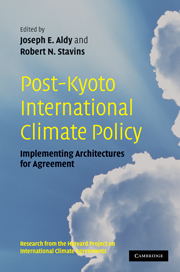Book contents
- Frontmatter
- Contents
- Harvard Environmental Economics Program, International Advisory Board
- Harvard Project on International Climate Agreements, Faculty Steering Committee
- Harvard Project on International Climate Agreements, Project Management
- List of figures
- List of tables
- List of contributors
- Foreword
- 1 Introduction
- Part I Alternative international policy architectures
- Part II Negotiation, assessment, and compliance
- Part III The role and means of technology transfer
- Part IV Global climate policy and international trade
- Part V Economic development, adaptation, and deforestation
- Part VI Modeling impacts of alternative allocations of responsibility
- 23 Modeling economic impacts of alternative international climate policy architectures: a quantitative and comparative assessment of architectures for agreement
- 24 Sharing the burden of GHG reductions
- 25 When technology and climate policy meet: energy technology in an international policy context
- 26 Revised emissions growth projections for China: why post-Kyoto climate policy must look east
- 27 Expecting the unexpected: macroeconomic volatility and climate policy
- Part VII Synthesis and conclusion
- Appendix A Selected List of Individuals Consulted, Harvard Project on International Climate Agreements
- Appendix B Workshops and Conferences, Harvard Project on International Climate Agreements
- Glossary and Abbreviations
- Index
27 - Expecting the unexpected: macroeconomic volatility and climate policy
Published online by Cambridge University Press: 05 June 2012
- Frontmatter
- Contents
- Harvard Environmental Economics Program, International Advisory Board
- Harvard Project on International Climate Agreements, Faculty Steering Committee
- Harvard Project on International Climate Agreements, Project Management
- List of figures
- List of tables
- List of contributors
- Foreword
- 1 Introduction
- Part I Alternative international policy architectures
- Part II Negotiation, assessment, and compliance
- Part III The role and means of technology transfer
- Part IV Global climate policy and international trade
- Part V Economic development, adaptation, and deforestation
- Part VI Modeling impacts of alternative allocations of responsibility
- 23 Modeling economic impacts of alternative international climate policy architectures: a quantitative and comparative assessment of architectures for agreement
- 24 Sharing the burden of GHG reductions
- 25 When technology and climate policy meet: energy technology in an international policy context
- 26 Revised emissions growth projections for China: why post-Kyoto climate policy must look east
- 27 Expecting the unexpected: macroeconomic volatility and climate policy
- Part VII Synthesis and conclusion
- Appendix A Selected List of Individuals Consulted, Harvard Project on International Climate Agreements
- Appendix B Workshops and Conferences, Harvard Project on International Climate Agreements
- Glossary and Abbreviations
- Index
Summary
Introduction
The global financial crisis, a deepening global recession, and continued turmoil in credit markets drive home the importance of developing a global climate architecture that can withstand major economic disruptions. A well-designed global climate regime and the attendant domestic policies in participating countries need to be resilient to large and unexpected changes in economic growth, technology, energy prices, demographic trends, and other factors that drive costs of abatement and emissions. Ideally, the climate regime would not exacerbate macroeconomic shocks, and would possibly buffer them instead, while withstanding defaults by individual members. Because climate policy must endure indefinitely in order to stabilize atmospheric concentrations of greenhouse gases (GHGs), all sorts of shocks will occur at some stage in the policy's existence. Anticipating such shocks may mean rejecting policies that might reduce emissions reliably in stable economic conditions but would be vulnerable to collapse—with consequent deterioration in environmental outcomes—in volatile conditions.
Macroeconomic volatility is the practical manifestation of an issue that has received considerable attention in the theoretical literature on the design of environmental policies: uncertainty about the costs and benefits of reducing emissions. In particular, macroeconomic shocks can cause the cost of regulation to be much higher or lower than anticipated. Unexpectedly stringent and costly regulations may become political lightning rods. Recent world events, for example, highlight the fact that economic surprises can subject governments to enormous pressures to relax or repeal taxes or other policies perceived to impede economic growth.
- Type
- Chapter
- Information
- Post-Kyoto International Climate PolicyImplementing Architectures for Agreement, pp. 857 - 886Publisher: Cambridge University PressPrint publication year: 2009
- 5
- Cited by



